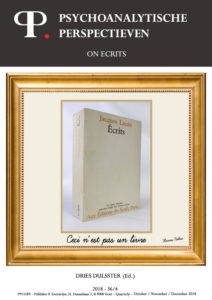
Vol 36 (4) 2018
Lacan’s écrits revisited: on writing as object of desire – Dany Nobus
The curious lack of an écrit on topology – Ed Pluth
The shine (éclat) of absences: lacan on the feminine in the fifties – Eve Watson
Dr. Lacan, we have a situation here! 62 years of resistance – Patricia Gherovici
Beyond alienation – Paul Verhaeghe
The subject and the lie: from méconnaissance to mensonge – Bart Rabaey
Ex-machina: sex, knowledge, and artificial intelligence – Isabel Millar
Unconscious structure in Sartre and Lacan – Gregory A. Trotter
Political logic of numerical community: borromean ones in Lacan and Beckett – Arka Chattopadhyay
On the pitfalls and perils of publishing/poubellication: some lessons from the field – Marleen Stevens & Dirk Bryssinck
Violence and aggression: a lacanian perspective – Evi Verbeke
Violence and aggression: a lacanian perspective
Although psychiatry often has to work with aggressive patients, the huge amount of coercion and exclusion based on aggression, teaches us that psychiatry does not know how to handle violence. In 1948 Lacan wrote an essay on aggressiveness, trying to approach the...
On the pitfalls and perils of publishing/poubellication: some lessons from the field
This paper will present the results of a field study that was inspired by the theories of Maleval on the functions of writing for the psychotic subject. More particularly, we wanted to find out to what extent these theories remain valid in the specific context of...
Political logic of numerical community: borromean ones in Lacan and Beckett
This paper reads the political logic of a numerical community in Lacan’s figurations on the One and in Beckett’s novel How It Is (1961). It offers a reading of the collective subject in Lacan’s Borromean logic which allows infinite knotting in the Borromean chain but...
Unconscious structure in Sartre and Lacan
Throughout his career, Jean-Paul Sartre had a contentious theoretical relationship with psychoanalysis. Nowhere is this more evident than in his criticisms of the concept of the unconscious. For him, the unconscious represents a hidden psychological depth that is...
Ex-machina: sex, knowledge, and artificial intelligence
This paper investigates the relationship between sex and knowledge and its manifestation in the development of Artificial Intelligence. With the concept of the extimate uncanny I analyse the status of the robotic companion as emblematic of the Lacanian non- existent...
The subject and the lie: from méconnaissance to mensonge
In this paper the author discusses Lacan's changing theory of the subject in the early texts of the Écrits and relates it to the notion of “the lie” in psychoanalysis. As Lacan’s view of the subject shifts form the Imaginary to the Symbolic, the source of man’s...
Beyond alienation
Alienation is a pivotal concept in critical theory, going back to Rousseau, Hegel and Marx. In his theory on the becoming of the subject, Lacan gave the concept an even more radical and original meaning (there is no original essence whatsoever) and doubled it with a...
Dr. Lacan, we have a situation here! 62 years of resistance
“We have a situation here!” The implication of this phrase is that we have a bad situation. This essay discusses the often quoted but rarely studied, Lacan’s “The Situation of Psychoanalysis and the Training of Psychoanalysts in 1956”. Over six decades later, his...
The shine (éclat) of absences: lacan on the feminine in the fifties
Lacan’s text, “Guiding Remarks for a Congress on Female Sexuality” (1958), is an important text in exploring Lacan’s conceptualisation of female sexuality in the fifties. The text however goes much further than this and discusses castration and the phallic function as...
The curious lack of an écrit on topology
It is well known that Lacan was interested in topology, especially in the 1960s. Yet for all the work he did with topology in his Seminar, it is curious that he never produced a writing dedicated solely to the topic. This paper tries to imagine what an “écrit” on...
Lacan’s écrits revisited: on writing as object of desire
This essay is intended as a scholarly contribution to the construction of a detailed biography of Lacan’s 1966 Écrits, which is conceived here as a living entity whose influence continues to radiate around the world, within as well as outside psychoanalytic circles....